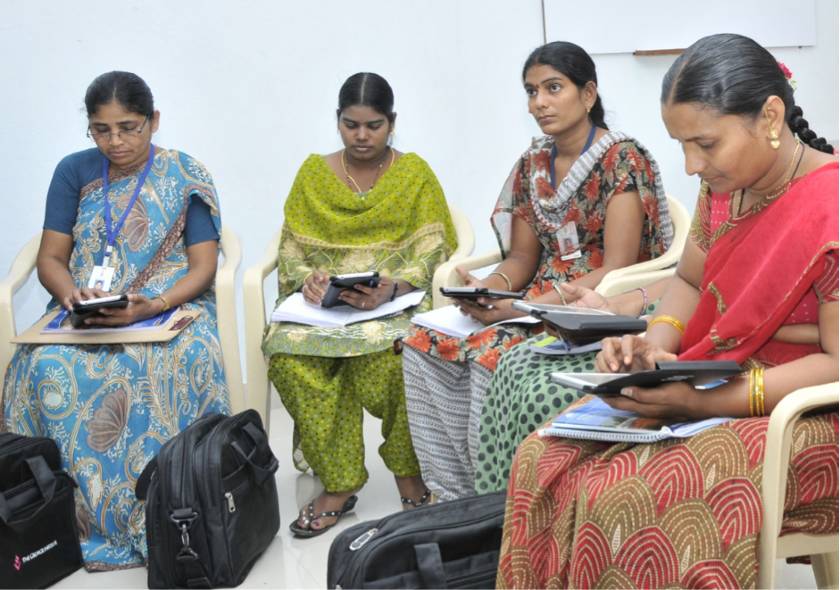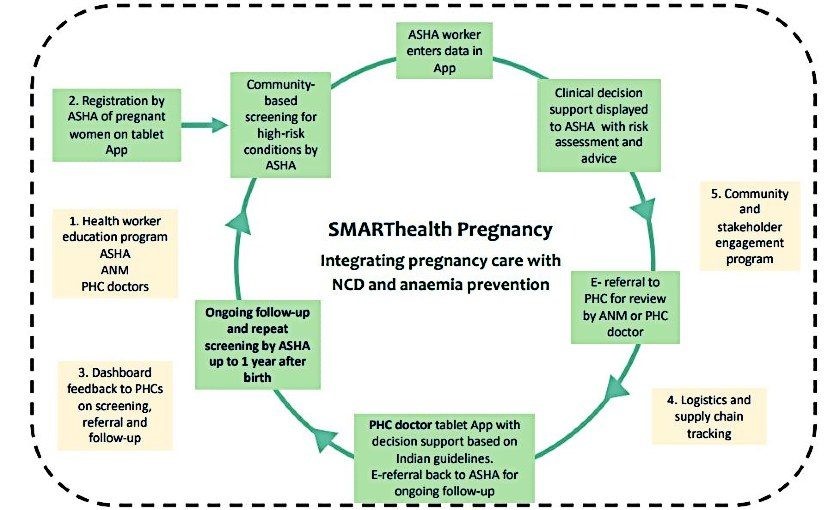Pregnancy as an opportunity to improve lifelong health, SMARThealth Pregnancy
Start Date
Project locations

Background
Pregnancy complications such as high blood pressure (also known as hypertension), gestational diabetes and anaemia increase risks to the mother and baby during pregnancy the world over, but the burden is particularly great in certain contexts, including many parts of rural India.
These complications can have longer-term consequences after birth. For instance, up to 50% of women who experience gestational diabetes will go on to develop type 2 diabetes within 5-10 years. Meanwhile, following preeclampsia (a disorder of pregnancy that is marked by the onset of high blood pressure), women are at increased risk of cardiovascular complications, while anaemia (which over half of the women in India experience during their pregnancy) can markedly affect a woman’s well-being, energy and productivity in society if it persists.
These challenges are coupled with the reality that non-communicable diseases (NCDs) such as cardiovascular diseases and diabetes are two of the leading causes of death for women in India. This interventional research responds to the urgent need to integrate NCD screening and prevention into established health programs in India, such as maternity care.
Aim

The overall goal of the SMARThealth Pregnancy program is to generate evidence-based recommendations to improve the detection and management of high-risk conditions during pregnancy, and to screen and treat women in India for ongoing problems in the first year after birth.
The program will quantify the impact of using community health workers (Accredited Social Health Activists, or ASHAs) to identify pregnant and postnatal women with high-risk conditions. This will be quantified by measuring the prevalence of anaemia prevalence during pregnancy and of care seeking for follow-up after a pregnancy affected by diabetes or hypertension. The work will produce the first evidence from rural India on the benefit of targeted high-risk pregnancy screening using ASHAs and the value of extended postnatal follow-up.
The SMARThealth Pregnancy program will lead to the development of a new approach to pregnancy and postnatal care in India, integrated within a life course view of health.
Research Methodology

This is a cluster randomised trial comparing usual care during pregnancy and after birth, to the SMARThealth Pregnancy intervention. The trial protocol is available here. This project builds on pilot work to co-develop and test the feasibility of the intervention.
SMARThealth Pregnancy trains and equips ASHAs to conduct point-of-care screening tests on all pregnant and postnatal women in their village to detect high-risk conditions. Information is entered via a tablet into a digital application – the SMARThealth platform - comprising decision-support advice including referral to the primary care doctor. Where referral is actioned, the doctor, who also has access to the SMARThealth Pregnancy app, provides advice for evidence-based prescribing and e-referral for ongoing community follow-up.
The trial is being conducted across 60 villages and 30 primary health centres in two states in India (Haryana and Telangana) with a recruitment aim of 3500 women.
The research team are also exploring the role of new technologies, such as ChatGPT, and its potential impact if integrated within the SMARThealth Pregnancy system. Work is also ongoing g with local communities to co-develop an intervention to support women’s perinatal mental health in rural communities in India (the PRAMH study).
See how this has helped women like Sravanthi
Thanks to the SMARThealth Program, Sravanthi was able to avoid the high blood pressure complications of her first pregnancy and now has a healthy little boy.






